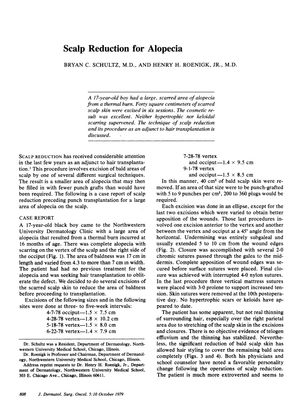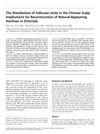Scalp Reduction for Alopecia
October 1979
in “
The Journal of Dermatologic Surgery and Oncology
”
scalp reduction alopecia hair transplantation scarred scalp skin thermal burn hypertrophic scarring keloidal scarring local anesthesia sutures scalp skin laxity punch grafting hair plugs baldness hair loss hair transplant scar tissue burn scar thickened scar raised scar numbing medicine stitches scalp flexibility hair grafting hair implants

TLDR Scalp reduction surgery successfully reduced baldness and improved self-image in a burn victim before hair transplantation.
In 1979, a case study was reported where a 17-year-old boy with a large scarred area of alopecia from a thermal burn underwent scalp reduction. Over six sessions, 40 cm² of scarred scalp skin were excised to reduce the area of baldness before hair transplantation. The excisions were performed at three- to five-week intervals, with the final cosmetic result being excellent and no hypertrophic or keloidal scarring observed. The reduction in bald scalp skin allowed for hair styling to cover the remaining bald area completely, and the patient experienced a favorable personality change, becoming more extroverted with an improved self-image. The technique of scalp reduction, performed in a formal operating room with local anesthesia, involved excising bald areas and closing the wound with sutures, sometimes requiring several successive procedures to allow for scalp skin laxity to return. This approach saved approximately 360 hair plugs that would have been needed for punch grafting and moved denser surrounding hair closer to the residual bald area. The case illustrates the benefits of scalp reduction as an adjunct to hair transplantation, with the specific excision technique tailored to the individual patient's needs.





